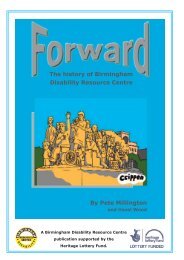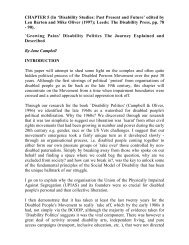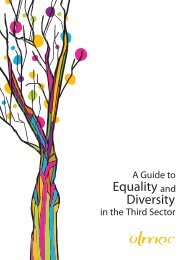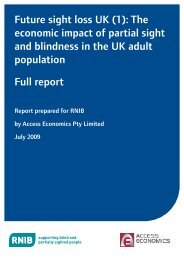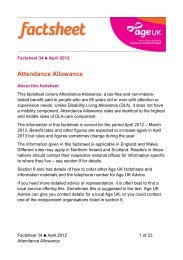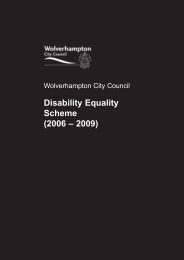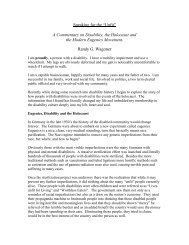What equality law means - Birmingham Disability Resource Centre
What equality law means - Birmingham Disability Resource Centre
What equality law means - Birmingham Disability Resource Centre
Create successful ePaper yourself
Turn your PDF publications into a flip-book with our unique Google optimized e-Paper software.
association, by<br />
auxiliary aid<br />
auxiliary service<br />
barriers<br />
Bill<br />
burden of proof<br />
charity<br />
Code of Practice<br />
comparator<br />
As in ‘discrimination by association’. See associated<br />
with.<br />
Usually a special piece of equipment to improve<br />
accessibility.<br />
A service to improve access to something often<br />
involving the provision of a helper/assistant.<br />
In this guide, this term refers to obstacles which get in<br />
the way of <strong>equality</strong> for disabled workers and other<br />
workers put at a disadvantage because of their<br />
protected characteristics. Unless explicitly stated,<br />
‘barriers’ does not exclusively mean physical barriers.<br />
For more on barriers in relation to disabled workers, see<br />
duty to make reasonable adjustments.<br />
A draft Act, not passed by Parliament.<br />
This refers to whether, in an Employment Tribunal, it is<br />
for the worker to prove that discrimination occurred or it<br />
is for the employer to disprove it. Broadly speaking, a<br />
worker must prove facts which, if unexplained, indicate<br />
discrimination. The burden of proof then shifts to the<br />
employer to prove there was no discrimination. If the<br />
employer cannot then prove that no discrimination was<br />
involved, the worker will win their case.<br />
A body (whether corporate or not) which is for a<br />
statutory charitable purpose that provides a benefit to<br />
the public.<br />
A statutory guidance document which must be taken<br />
into account by courts and tribunals when applying the<br />
<strong>law</strong> and which may assist people to understand and<br />
comply with the <strong>law</strong>.<br />
Direct discrimination occurs when an employer treats a<br />
job applicant or worker less favourably than they treat<br />
or would treat another worker in similar circumstances<br />
because of a protected characteristic. The worker with<br />
whom the job applicant or worker compares their<br />
treatment is called a ‘comparator’. Sometimes there is<br />
no actual comparator, but the worker can still claim that<br />
another worker without their protected characteristic<br />
88




